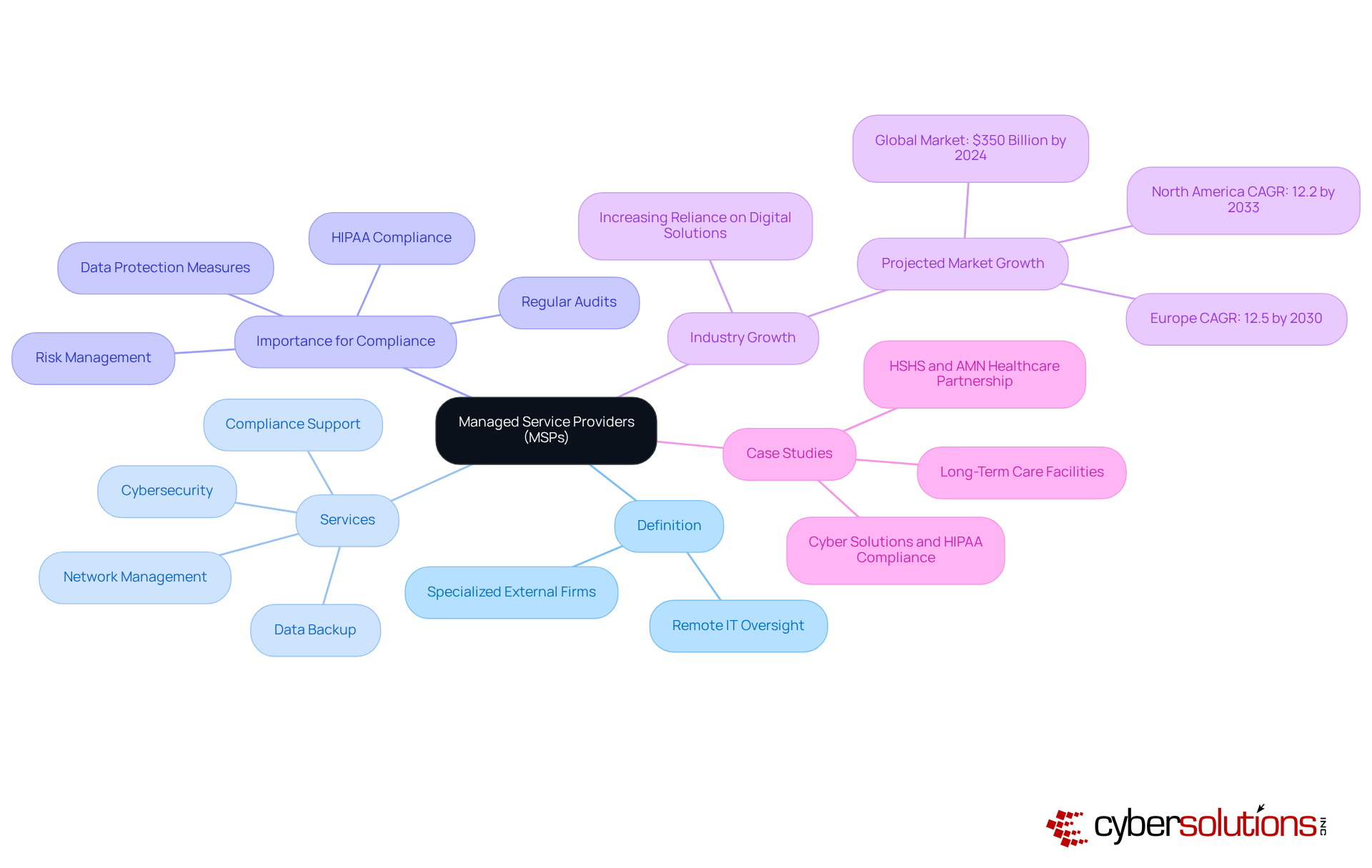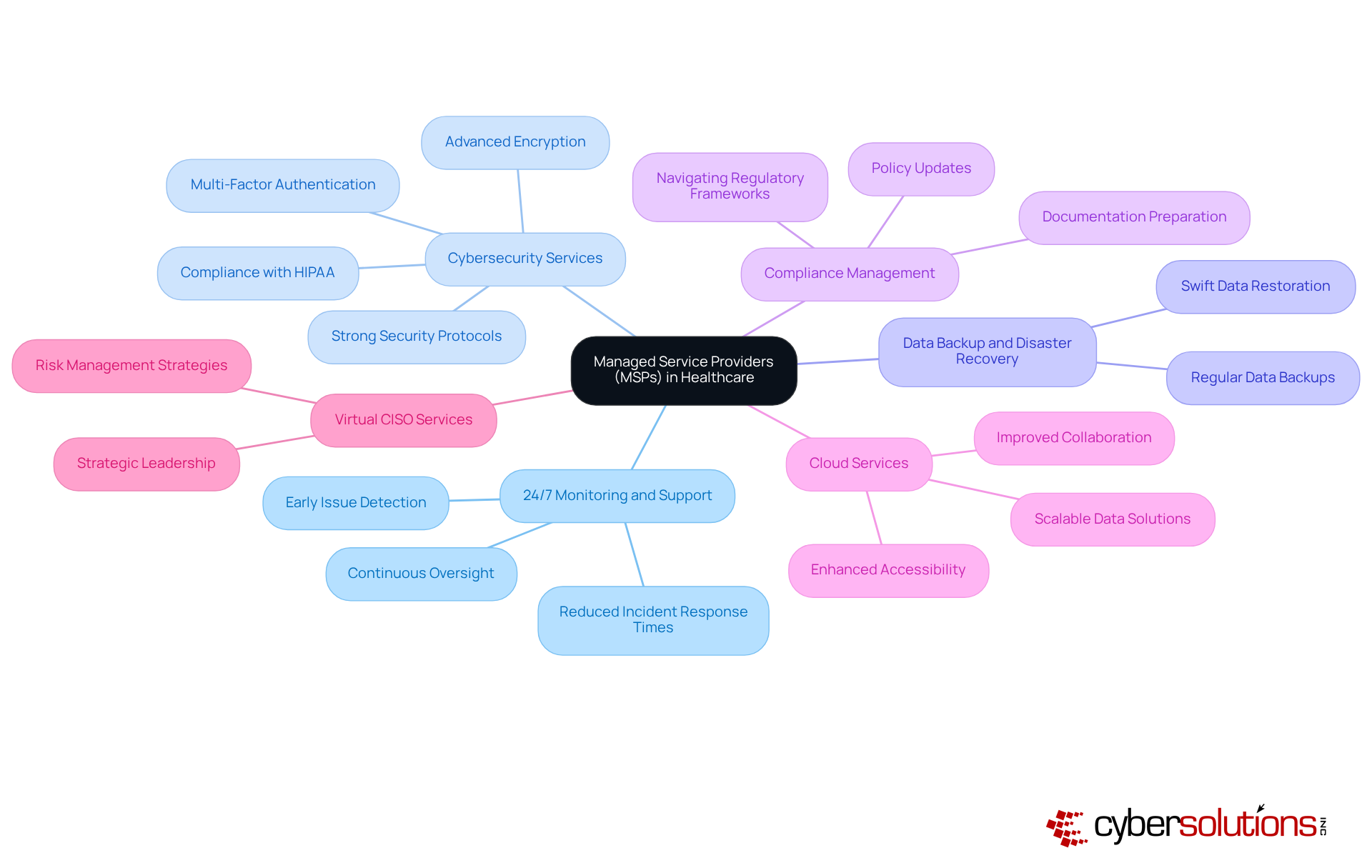
Managed Service Providers (MSPs) play an essential role for healthcare CFOs, delivering specialized IT management services that not only ensure compliance but also enhance cybersecurity and improve operational efficiency. In today's landscape, where cybersecurity threats are increasingly sophisticated, it is crucial for healthcare organizations to prioritize these challenges.
By outsourcing IT functions to MSPs, healthcare organizations can shift their focus back to patient care, all while reaping significant cost savings and gaining access to advanced technologies. Furthermore, MSPs offer expert guidance in navigating complex regulatory requirements such as HIPAA, which is vital for maintaining compliance in a demanding environment.
This strategic partnership empowers CFOs to manage resources effectively and foster a more secure healthcare ecosystem.
In the intricate realm of healthcare, the significance of Managed Service Providers (MSPs) has become paramount for ensuring operational efficiency and regulatory compliance. By outsourcing IT management to these specialized firms, healthcare organizations can bolster their cybersecurity measures and concentrate on their primary mission: delivering exceptional patient care.
As the landscape of healthcare technology evolves, a pressing question arises: how can healthcare CFOs harness the expertise of MSPs to adeptly navigate the challenges of compliance and security while maximizing operational effectiveness?
The answer lies in recognizing the critical role MSPs play in addressing the multifaceted cybersecurity threats that healthcare organizations face today.
MSPs stands for Managed Service Providers, which are specialized external firms that remotely oversee a medical entity's IT infrastructure and end-user systems. Their services encompass network management, cybersecurity, data backup, and compliance support, enabling healthcare providers to concentrate on their primary mission—delivering exceptional patient care. In an era where regulatory compliance is paramount, MSPs play a pivotal role in assisting organizations in adhering to stringent regulations such as HIPAA. By outsourcing these essential functions, medical entities gain access to advanced technology and specialized expertise, significantly reducing the administrative burden associated with in-house management.
The impact of MSPs on medical compliance is substantial. They implement robust , conduct regular audits, and prepare entities for external evaluations, ensuring that compliance frameworks are not only met but exceeded. Cyber Solutions, for instance, offers comprehensive HIPAA compliance solutions that integrate proactive risk management, audit support, and expert guidance through their virtual CISO services. This ensures that medical organizations are audit-ready and can effectively safeguard patient health information (PHI).
Industry leaders underscore the advantages of delegating IT management to MSPs. As Bernadette Wilson articulates, "An MSP provides the benefit of a skilled ally," highlighting the significance of specialized expertise in managing the complexities of IT within the medical field. Furthermore, MSPs enhance operational effectiveness by delivering adaptable solutions tailored to the specific needs of medical institutions, ensuring they can respond to evolving regulatory landscapes and technological advancements.
The managed services sector is projected to approach nearly $350 billion globally by the end of 2024, underscoring the increasing reliance on MSPs in healthcare. Case studies reveal that medical entities utilizing MSPs, such as those leveraging Cyber Solutions' services, experience improved IT infrastructure management. For example, Cyber Solutions conducts thorough assessments to identify compliance gaps and risks, offering actionable recommendations to bolster security configurations and enhance staff cybersecurity training. Overall, MSPs are indispensable partners in the medical field, empowering entities to thrive securely in a digital-first environment.

In today's swiftly changing business environment, the role of Managed Service Providers, which MSPs stands for, has become crucial in enhancing IT operations for medical entities. With the increasing prevalence of , healthcare CFOs must prioritize robust security measures to protect sensitive patient data. MSPs offer access to advanced technologies and specialized expertise, enabling these financial leaders to maintain a competitive edge without the burden of extensive in-house IT resources.
One of the key advantages of partnering with an MSP is the flat-rate pricing model, which simplifies budgeting and enhances financial predictability. This model removes unforeseen IT costs, allowing organizations to allocate resources more efficiently. For instance, those utilizing managed security services can achieve cost reductions of 20% to 30%. Furthermore, proactive administration by MSPs significantly reduces downtime—an essential factor in medical environments where service interruptions can hinder patient care and lead to substantial revenue losses.
In 2023, the average expense of a healthcare data breach rose to $10.93 million, underscoring the necessity for strong cybersecurity measures that MSPs provide. Notably, 81% of firms are opting for external expertise to bolster their cybersecurity defenses, reflecting a growing trend within the industry. Additionally, MSPs stand for Managed Service Providers, who assist organizations in navigating the complexities of regulatory compliance, ensuring adherence to industry standards such as HIPAA. Their comprehensive HIPAA compliance solutions integrate robust cybersecurity measures, proactive risk management, and expert guidance, helping organizations avoid costly penalties.
With nearly 158 million medical records compromised in recent years, the urgency for effective cybersecurity cannot be overstated. Moreover, MSPs offer 24/7 network monitoring and alert services, ensuring that suspicious activities are detected and addressed before they escalate into significant threats. By streamlining operations and enhancing efficiency, Managed Service Providers (MSPs stand for) empower financial officers in the medical sector to focus on strategic initiatives that foster organizational success, all while providing flexible and scalable delivery models to adapt to evolving requirements.

In today's healthcare landscape, the role of Managed Service Providers, which MSPs stands for, is more crucial than ever. They offer a variety of tailored to meet the specific needs of medical institutions, ensuring that these organizations can navigate the complexities of modern technology while maintaining high standards of patient care. Key offerings include:
Incorporating these services not only addresses the urgent IT requirements of medical facilities but also empowers them to thrive in an increasingly regulated and technologically advanced environment, ensuring they remain secure, compliant, and ready for audits.

In today's rapidly evolving digital landscape, collaborating with a Managed Service Provider (MSP), where MSPs stands for Managed Service Providers, is not just beneficial; it is essential for medical organizations. The significance of cybersecurity in healthcare cannot be overstated, particularly given the unique challenges faced by CFOs in this sector. Key benefits of partnering with an MSP include:
In summary, the strategic engagement of an MSP, where MSPs stands for Managed Service Providers, not only addresses immediate operational challenges but also positions healthcare organizations for long-term success in a competitive and complex environment.

Managed Service Providers (MSPs) have become indispensable allies for healthcare organizations, delivering specialized IT management that enables these entities to concentrate on their primary mission: patient care. In an era marked by increasing cybersecurity threats, leveraging the expertise of MSPs allows healthcare CFOs to bolster operational efficiency, ensure compliance with stringent regulations, and safeguard sensitive patient data. This strategic collaboration not only alleviates the burden of in-house IT management but also empowers medical organizations to thrive within an increasingly complex digital landscape.
The multifaceted benefits of MSPs are underscored throughout the article, including cost efficiency, enhanced security, and the ability to scale operations to meet evolving demands. MSPs offer a range of services—from 24/7 monitoring and cybersecurity to compliance management and cloud solutions—tailored to address the unique challenges that healthcare institutions face. By integrating these services, organizations can significantly mitigate operational risks and ensure preparedness for audits and regulatory evaluations.
The escalating reliance on MSPs within the healthcare sector highlights their crucial role in cultivating a secure and efficient operational environment. As the industry continues to evolve, embracing the capabilities of Managed Service Providers is essential for healthcare organizations striving to remain competitive and compliant. Engaging with an MSP is not merely a strategic choice; it is a necessary step toward safeguarding patient information, optimizing resources, and ultimately enhancing the quality of care delivered to patients.
What are Managed Service Providers (MSPs)?
Managed Service Providers (MSPs) are specialized external firms that remotely oversee a medical entity's IT infrastructure and end-user systems, providing services such as network management, cybersecurity, data backup, and compliance support.
How do MSPs assist healthcare providers?
MSPs enable healthcare providers to focus on delivering exceptional patient care by managing essential IT functions and reducing the administrative burden associated with in-house management.
Why is compliance important for medical entities?
Compliance is crucial for medical entities to adhere to stringent regulations, such as HIPAA, ensuring the protection of patient health information (PHI) and avoiding potential legal issues.
What specific compliance support do MSPs provide?
MSPs implement robust data protection measures, conduct regular audits, and prepare medical entities for external evaluations, ensuring compliance frameworks are met and exceeded.
How do MSPs enhance cybersecurity for medical organizations?
MSPs, like Cyber Solutions, offer comprehensive HIPAA compliance solutions that include proactive risk management, audit support, and expert guidance to safeguard patient health information.
What are the benefits of outsourcing IT management to MSPs?
Outsourcing IT management to MSPs provides access to specialized expertise, enhances operational effectiveness, and delivers adaptable solutions tailored to the specific needs of medical institutions.
What is the projected growth of the managed services sector?
The managed services sector is projected to approach nearly $350 billion globally by the end of 2024, indicating an increasing reliance on MSPs in healthcare.
How do case studies demonstrate the effectiveness of MSPs?
Case studies show that medical entities utilizing MSPs, like Cyber Solutions, experience improved IT infrastructure management, including assessments to identify compliance gaps and actionable recommendations for security enhancements.
Why are MSPs considered indispensable partners in the medical field?
MSPs empower medical entities to thrive securely in a digital-first environment by providing essential IT management and compliance support, allowing healthcare providers to concentrate on patient care.